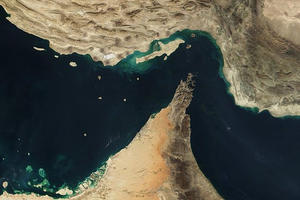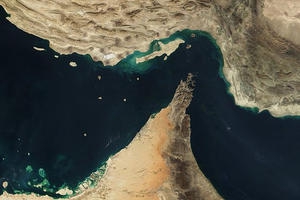
Strategic oil reserves will be needed if Iran seeks to close the choke point Strait of Hormuz because overland pipelines can only carry one-third of the oil supplies that move through the waterway, an Arab energy group has warned.
The Tehran regime has threatened to block the 112-mile strait, the only way in and out of the Persian Gulf, if the United States attacks over the�Iranian nuclear�program.
The reduction in�oil exports�from the gulf, as well as a complete halt to natural gas shipments, an Iranian closure, even one lasting a few weeks, will batter the global economy by sending energy prices soaring unless steps are taken to ensure that the shortfall is covered.
Shutting down Hormuz, the Arab Petroleum Investment Corp. observed, "should prompt the International Energy Agency to act alone to ensure the oil market remains well supplied by using its strategic stockpiles."
"In the event of a crisis, Saudi Arabia's spare production capacity would obviously be useless," it said.
Thus, the International Energy Agency, the industrialized world's energy watchdog, "would have to shoulder the burden of dealing with the aftermath alone," the report noted.
"Balancing the market would be even more challenging as 85 percent of the crude oil and 50 percent of the LNG being shipped through Hormuz is bound eastward where key non-IEA members such as China, India, Indonesia and Thailand may not have built up sufficient strategic petroleum stocks."
Apicorp, based in Saudi Arabia, is an affiliate of the Organization of Arab Petroleum Exporting Countries.
Over the last year or two,�Saudi Arabia�and the�United Arab Emirates, the biggest oil producers among the Arab monarchies on the gulf's western shore, have been building or upgrading pipelines to bypass the narrow strait that lies at the southern end of the gulf.
At present, these states, plus Iran and Iraq, ship some 17 million barrels of oil a day aboard tankers through the strait. Apicorp says that's nearly 31 percent of the global oil trade.
At the same time, some 2 million barrels per day of liquefied natural gas -- about 33 percent of the world's LNG trade -- also moves through the strait. But the pipelines that bypass the strait through Saudi Arabia, the United Arab Emirates and Iraq can carry only half the seaborne trade -- about 8.5 million bpd.
Saudi Arabia has pipelines running westward overland from the oil fields in the eastern Gulf shore to the Red Sea port of Yanbu. The Emirates recently built a pipeline from its oil fields to the port of Fujairah, which lies south of the strait.
Iraq has pipelines running north to Turkey's Mediterranean coast but the only outlet from its large southern fields remains the gulf.
These pipelines leave Kuwait, Qatar and Bahrain, as well as Iran, with no outlet for their oil exports, and no outlet at all for LNG shipments from Qatar and the Emirates, the gulf's two natural gas exporters.
So, the Apicorp report observed, "while the combined operating capacity of the alternative routes is some 8.5 million bpd, spare capacity -- taking into consideration both unused capacity and capacity additions made in 2012 -- is just a little more than a third of the volume that transited the strait in 2011.
"The amount of oil being pumped through the pipelines can be raised by using drag-reducing agents or so-called 'flow improvers.'
"But even so, it is hard to argue that currently available alternatives are enough to alleviate the impact of a crisis in the strait," the report observed.
There have been suggestions that apart from boosting the capacity of these pipelines, the Gulf Arab states should build others to Oman, on the southeastern tip of the Arabian Peninsula, outside Hormuz, or even Yemen on the southwestern corner.
Yemen's currently a war zone and likely to remain so for some time, which rules it out. But a pipeline network to Oman, south of the Emirates and outside Hormuz, has more merit.
The report's author, Apicorp senior consultant Ali Aissaoui of Algeria, cited a recent statement by the IEA reaffirming it's ready to respond to any major disruption in oil supplies."
But he cautioned: "It remains to be seen what this response would entail and what effect it would have in a market gripped by panic."
The Iran Project is not responsible for the content of quoted articles.











